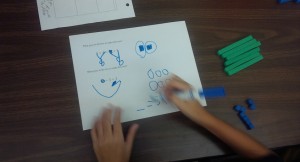
FCR-STEM was awarded a four-year grant from the Institute of Education Sciences to conduct a large-scale, rigorous evaluation of Cognitively Guided Instruction (CGI). CGI is a professional development program for elementary mathematics teachers. The CGI program was initially developed in the 1980s at the University of Wisconsin and is based upon decades of research on how young children solve word problems and perform operations on number with understanding. The proposed evaluation will largely replicate a small experimental study (Carpenter, Fennema, Peterson, Chiang, & Loef, 1989), incorporating changes in the professional development over the past several decades and using research design and data analytic techniques developed since the 1989 study.
Cluster Randomized Controlled Trial: Participants in the cluster randomized controlled trial are 22 schools (11 assigned to treatment, 11 assigned to control), more than 200 first and second grade teachers, and over 3,000 students. Treatment group teachers are engaged in two years (8 days per year) of CGI professional development workshops, provided by the Teachers Development Group, focused on the mathematical domains of number, operations, and algebraic thinking. The teachers in the counterfactual condition engage in practice-as-usual with respect to professional development and mathematics instruction.
Repeated measures of both teachers and students are planned over a three-year period, with annual analysis making use of latent variable measurement models and accounting for the multilevel and longitudinal structure of the data. Teacher measures include mathematical knowledge for teaching, teacher beliefs about mathematics teaching and learning, teachers’ knowledge of the CGI framework, teachers’ knowledge of their own students’ thinking processes, and teacher collaboration. Student mathematical learning will be measured by standardized tests as well as mathematics interviews individually administered with a stratified random sample of students.
Development of new assessments: The research team is developing valid and reliable measures to assess multiple facets of Mathematical Knowledge for Teaching (MKT), and Pedagogical Content Beliefs, specifically for primary grades (K-2) teachers. The team is also developing valid and reliable assessments of student knowledge in mathematics involving both group-administered, written formats as well as one-on-one interview formats.
Building on the framework of MKT proposed by Ball, Thames, and Phelps (2008), the MKT instrument uses a combination of multiple choice, fill-in-the-blank, and open response items designed to measure domains of teacher knowledge involved with teaching mathematics at the elementary and early elementary level. To date, this instrument has been field-tested with over 700 teachers in Florida over a period of two years.
The team has developed a questionnaire designed to measure teachers’ beliefs about mathematics teaching and learning. Research involving a variety of methods, including cognitive interviews and factor analytic techniques, have identified several potential constructs within this domain that can be reliably measured. To date, this instrument has been field-tested with over 700 teachers in Florida over a period of three years.
This project is supported by the Institute of Education Sciences, U.S. Department of Education, through Grant # R305A120781 to Florida State University (Principal Investigator: Robert C. Schoen). The opinions expressed are those of the authors and do not represent views of the Institute or the U.S. Department of Education.
PRINCIPAL INVESTIGATOR
Robert C. Schoen, Ph.D.
FCR-STEM Associate Director
Co-Principal Investigators
Walter G. Secada, Ph.D., University of Miami
Juli Dixon, Ph.D., University of Central Florida
FUNDING
Institute of Education Sciences, $3.4 million, 2012-2016
Senior Project Team
- Amanda Tazaz, Ph.D., FCR-STEM
- Mark LaVenia, FCR-STEM
- Kristopher Childs, Ph.D., Texas Tech University
Advisory Board
Thomas P. Carpenter, Ph.D., University of Wisconsin-Madison Vicki Jacobs, Ph.D., University of North Carolina at Greensboro Susan Empson, Ph.D., University of Texas–Austin Henry Kepner, Ph.D., University of Wisconsin-Milwaukee David Purpura, Ph.D., Purdue University Published Manuscripts
Whitacre, I., Schoen, R. C., Champagne, Z. M., & Goddard, A. (in press). Relational thinking: What’s the difference? Teaching Children Mathematics.
Conference Presentations
Schoen, R. C., Secada, W., & Tazaz, A. (June, 2015). Results after the first year of a randomized controlled trial of CGI. Presented at the biennial Cognitively Guided Instruction National Conference, Lawndale, CA.
Schoen, R. C., Dixon, J.K., Tazaz, A., & Childs, K. J. (2015, February). Investigating associations among professional development, mathematical knowledge for teaching, and pedagogical content beliefs. Presented at the annual conference of the Association of Mathematics Teacher Educators, Orlando, FL.
Bray, W., Schoen, R. C., Nielsen, L., Wolfe, C. B., & Tazaz, A. (2015, February). Developing a measure of mathematical knowledge for teaching for primary grades teachers. Presented at the annual conference of the Association of Mathematics Teacher Educators, Orlando, FL.
